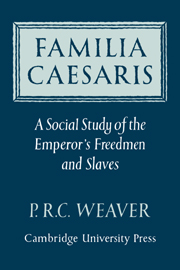Book contents
- Frontmatter
- Contents
- Preface
- Abbreviations
- INTRODUCTION
- PART I NOMENCLATURE AND CHRONOLOGY
- PART II THE FAMILY CIRCLE
- PART III THE EMPEROR'S SERVICE
- 12 Vicarii
- 13 Liberti servus and liberti libertus
- 14 ‘Vicariani’
- 15 The occupational hierarchy: some points of method
- 16 Sub-clerical grades
- 17 Adiutores: junior clerical grades
- 18 Intermediate clerical grades
- 19 Senior clerical grades
- 20 Senior administrative grades: a rationibus, ab epistulis, etc.
- 21 Freedman procurators
- 22 Imperial freedmen and equestrian status: the father of Claudius Etruscus
- CONCLUSION
- APPENDIXES
- Bibliography
- Index
- Frontmatter
- Contents
- Preface
- Abbreviations
- INTRODUCTION
- PART I NOMENCLATURE AND CHRONOLOGY
- PART II THE FAMILY CIRCLE
- PART III THE EMPEROR'S SERVICE
- 12 Vicarii
- 13 Liberti servus and liberti libertus
- 14 ‘Vicariani’
- 15 The occupational hierarchy: some points of method
- 16 Sub-clerical grades
- 17 Adiutores: junior clerical grades
- 18 Intermediate clerical grades
- 19 Senior clerical grades
- 20 Senior administrative grades: a rationibus, ab epistulis, etc.
- 21 Freedman procurators
- 22 Imperial freedmen and equestrian status: the father of Claudius Etruscus
- CONCLUSION
- APPENDIXES
- Bibliography
- Index
Summary
The literary sources show clearly that the Familia Caesaris in general was an elite among the slave and freedman classes of Imperial society. But it is also clear that this was not equally true for all its members, nor for all periods. A detailed examination of the voluminous inscriptional material reveals a considerable degree of social differentiation within the Familia Caesaris.
In nomenclature, apart from the legal differentiation between vicarius, servus, libertus, etc., the use of status indication, agnomen and occupational title are all significant for status and, with some exceptions (e.g. aquarii) and some regional variations (e.g. Africa), are rarely used by those of low status. The occupational elite are the professional civil servants of the clerical and senior administrative grades who could rise to auxiliary procuratorships or to sole headships of departments, always distinct from, but within measuring distance of, the equestrian procurators themselves. Those in the clerical–administrative service, whether through background or connections within the Familia Caesaris, patronage, training or ability, began their professional careers early and were distinctly superior to those who spent their lives in sub-clerical or domestic occupations. With the exception of posts of special opportunity or responsibility within the Palace, there was little chance of crossing the occupational dividing line upwards into the administrative service. In terms of location, Rome held the advantage over the provincial centres for most administrative grades, with the exception of those higher freedman careers where movement from one centre to another was more frequent, and among the slave dispensatores.
- Type
- Chapter
- Information
- Familia CaesarisA Social Study of the Emperor's Freedmen and Slaves, pp. 295 - 296Publisher: Cambridge University PressPrint publication year: 1972



